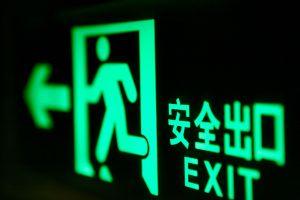First Five Victims of Renewed China’s Crackdown on Crypto Announced
Recently, at least five local Chinese crypto exchanges have halted operations or announced they will no longer serve domestic users as the country started a new crackdown on crypto trading.

Last week, Chinese exchange operators Bitsoda and Akdex announced termination of service, according to Bloomberg. Also, Biss said this month it’s halted operations while executives cooperate with a government investigation. Moreover, Btuex said on Monday it will shut in response to Chinese government orders, “reopening in future to serve only overseas users,” the report added. And, finally, Idax said on Sunday it will also no longer serve users in China but focus on users abroad, citing policy reasons.
As reported, People’s Bank of China Shanghai headquarters said last week that it would crack down on a resurgence of illegal activities around virtual currencies, and cautioned investors not to confuse such instruments with blockchain technology. Moreover, also as reported, Weibo, a Chinese Twitter-like service, suspended accounts operated by major exchange Binance and blockchain platform Tron (TRX).
China banned crypto exchanges in late 2017 as a way to stem trading, but the attempt failed to eliminate cryptocurrency trading completely as it is still available through over-the-counter platforms or services that deal with crypto assets only.
Meanwhile, local cryptocurrency holders are transferring their money to safer places. Major crypto wallet ImToken told Bloomberg that tether (USDT), which is used to move money into and out of digital assets, transactions more than doubled among its almost 10 million users after the latest crackdown was announced, reaching USD 66 million on November 22.
“I do believe, however, [China is] moving in a similar direction as Japan and other jurisdictions that have tight and clear regulations for crypto businesses,” Katie Talati, head of research at Arca, a U.S.-based digital asset manager, told Bloomberg.
However, before China legalizes cryptocurrency exchanges, crypto must become “a real asset class,” Kelvin Koh, Co-founder and Partner of a Singapore based hedge fund, Spartan Capital, said recently, adding that “China will eventually embrace it and crypto exchanges will be legitimized.”




